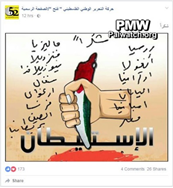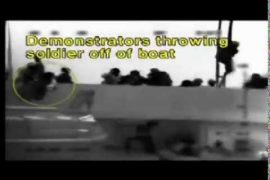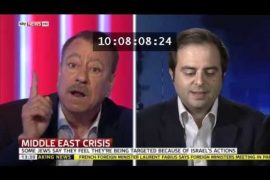This is a guest post by Aron White.
The discussion and analysis of Resolution 2334, passed by the Security Council last week, is still continuing in earnest. But in all the coverage of the resolution and its aftermath in the media, there is one central point – maybe in fact, the most central point – that has not been mentioned and it is actually just one photo. I would argue however, that without mentioning this photo, no media outlet can truly have claimed to have presented the full story of Resolution 2334 and its meaning.
This image (captured by Palestinian Media Watch) is from the Facebook page of Fatah; the party of Mahmoud Abbas. Posted a day after the resolution, the words at the top of the image say “Thank you!” and then it lists the fourteen countries who voted for resolution 2334. In the centre of the picture is the Palestine shaped knife stabbing the word “settlement” with blood pouring from it.
This reaction to resolution 2334 is not praise or condemnation, but incitement of the most explicit type – a call to people to stab and attack settlers and settlements. And it comes not from a fringe extremist, but from the party of the President of the Palestinian Authority himself.
This was not widely reported – just as many other instances of Palestinian incitement are not reported – but to ignore it is to ignore a crucial piece of the jigsaw. Focusing on it helps understand the difference between Western and Palestinian views of the conflict. Whereas Samantha Power, in her speech after the American abstention at the vote, spoke of a desire to see two states next to each other in peace and security, this cartoon speaks of a desire to attack and harm settlers. For the USA, resolution 2334 was about securing the prospects of a two state solution. This cartoon implies that the Palestinians see resolution 2334 as supporting their right to violence – and rather than pushing them to coexistence – it makes them emboldened in radical positions.
The fact that such a cartoon goes unmentioned in UK media is also jarring considering the level of incitement that is considered newsworthy if it comes from an Israeli politician. Netanyahu`s comments about ‘the Arabs voting in droves’ still are mentioned frequently, a year and a half after they happened – yet surely a call to murder settlers is far worse than playing the race card in an election?
The extent and depth of Palestinian incitement is a significant piece of any understanding of the Arab Israeli conflict; one that is not focused on enough and which was missed once again last week. The veneration of martyrs, financial support for terrorists and spreading of incitement via pictures and music do not go away just because Western ears don’t want to read or hear about them. Until the Palestinians are challenged on these issues, they will not change their approach and will remain more hardline in their position – harming both Israel and themselves.






